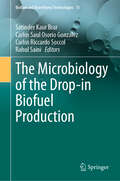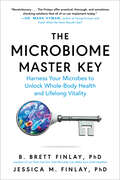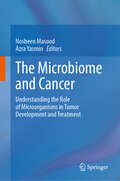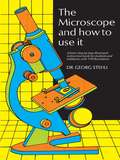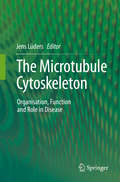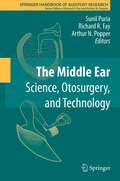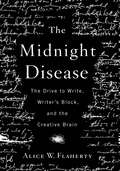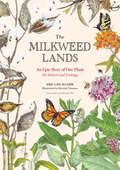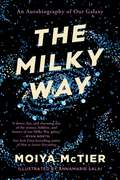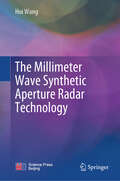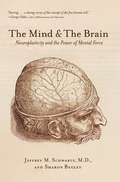- Table View
- List View
The Microbiology of the Drop-in Biofuel Production (Biofuel and Biorefinery Technologies #15)
by Satinder Kaur Brar Carlos Saul Osorio Gonzalez Carlos Riccardo Soccol Rahul SainiThe Microbiology of the Drop-in Biofuel Production is a comprehensive resource that provides basic and applied knowledge, technologies, and regulations of current drop-in biofuel production. This book focuses on liquid drop-in biofuel produced trough biochemical process and all the important aspect like renewable substrates, biochemical routes, genetic modifications, technology innovations, regulation, commercialization as well as the future perspectives to be implemented. Starting with an introductory chapter about the conventional methods to produce drop-in biofuels, the book will guide the reader into the specific biochemical processes for its production, covering aspect like renewable feedstocks, microorganism, classification, and the circular economy around all the production process. This book provides a detailed overview about the microbiology, regulation and commercialization aspects of drop-in biofuel production and is essential for researchers, students, and professors working in the bioenergy area.
The Microbiome Master Key: Harness Your Microbes to Unlock Whole-Body Health and Lifelong Vitality (Second Edition)
by B. Brett Finlay Jessica M. FinlayLearn the secret to whole-body, lifelong health: the teeming world of microbes inside and all around you. Hand sanitizer. Social distancing. Antibiotics. Fending off germs has long been considered one of the cornerstones of good health. But what if better health and more graceful aging actually went hand-in-hand with embracing microbes? Your body is teeming with microbes—not just in the gut, but also on your skin, in your lungs, and beyond. And they impact everything from your sleep, cognition, mood, heart health, and energy to your likelihood of developing many diseases. As groundbreaking new studies are showing, taking care of your microbiome—inside and out—can help you improve your day-to-day health and even help prevent or reverse some of the most common age-related diseases. This eye-opening book breaks down what the latest research says about how the microbiome affects all aspects of physical and mental health—and what you can do about it. Potentially change the trajectory of 9 out of 10 leading causes of death, including heart disease, cancer, lung disease, stroke, Alzheimer’s disease, and diabetes Increase your resistance to pathogens like the flu and COVID-19 Keep your skin soft, healthy, supple, and less wrinkled Stabilize your weight and control blood sugar Improve your physical fitness and strength Fight “inflammaging”—low-grade inflammation that hastens the aging process Get a more restful and rejuvenating night’s sleep Reduce stress and improve mental health—and your long-term quality of life The Microbiome Master Key is an updated and expanded new edition of The Whole-Body Microbiome.
The Microbiome and Cancer: Understanding the Role of Microorganisms in Tumor Development and Treatment
by Nosheen Masood Azra YasminThis book explores the intricate relationship between microorganisms and cancer. It begins by discussing the microbiome of the human body and its role in cancer development. The cellular organization of tumors is also explored in detail. The book then delves into the specific microorganisms that have been associated with various types of cancer. The role of HCV in hepatocellular carcinoma is discussed in depth, as well as cancers associated with EBV. Further, it also explores the link between HPV and urogenital and head and neck cancers, and Kaposi’s sarcoma-associated Herpes virus. The chapter is dedicated to dispelling myths surrounding Aspergillus and lung cancer and examines the complications associated with fungal infections in cancer treatment. The book then explores the link between parasites and cancer, and the role that protists play in cancer development. Finally, the book concludes with a discussion of cancer management and therapies related to microorganisms. Overall, the book provides a comprehensive overview of the relationship between microorganisms and cancer and sheds light on how this relationship can be harnessed for more effective cancer management and treatment.
The Microscope and How to Use It
by Georg StehliA world of pleasure, excitement and new knowledge awaits one who learns to use the microscope — a world in which table salt crystals appear as jewels, a drop of water swarms with life, a butterfly's wings reveal a cascade of multicolored particles. This book is for anyone who would like to enter that world, whether or not he has ever used a microscope before. No special knowledge is required. In non-technical language and with generous use of illustration, the author explains how a microscope works and what kind to use; how to adjust the instrument and position the specimens to be viewed; examination of simple objects: a human hair, feathers, milk. At the same time, he shows how to prepare the objects, what to purchase for the purpose, how to care for it; one's every question is anticipated and clearly answered. The fundamentals understood, the reader is taken into further exploration viewing insect parts, diatoms, plankton, molds, leaves, ferns, fruit rinds, fish scales, animal parts. As we proceed, we learn step by step the techniques involved: use of chloroform, preparation of permanent slides, mounting in glycerine, preparing dye solutions, dissection, and blood smearing. We learn how to detect fat, find Vitamin C in food substances, prepare a frog for examination, view and distinguish bacteria, use the oil-immersion objective, dye bacilli spores, do microphotography, cut sections with the microtome. Following Dr. Stehli's careful instructions, we have entered and gone well into the fascinating world of microscopy. The invention of the microscope itself started science on new courses, entire fields of new knowledge. The use of a comparatively simple microscope today can start one on a lifetime interest, an absorbing hobby, a career in science, or a permanent addition to one's cultural background. This book provides all the help needed, whether one is adult or student, hobbyist or scientifically serious, seeking education or merely curious about the minute world that exists all about us. 119 photographs and drawings.
The Microtubule Cytoskeleton
by Jens LüdersThis book provides an overview on the organization andfunction of the microtubule cytoskeleton, which is essential to many cellularprocesses and profoundly linked to a range of human diseases. Covering basic concepts as well as molecular details, the book discusses howmicrotubules are nucleated and organized into ordered arrays, at different cellcycle stages and in distinct cell types. In addition, the book highlights howdefects in the microtubule cytoskeleton are linked to diseases such asneurodevelopmental disorders. The book is intended for students, graduates and moresenior researchers in cell and developmental biology as well as for medicaldoctors.
The Middle Ear
by Arthur N. Popper Richard R. Fay Sunil PuriaThe middle ear plays a vital role in the sense and sensitivity of hearing. Of the various characteristics that distinguish mammals from other vertebrates, several pertain specifically to the middle-ear system, such as the presence of three middle-ear bones and the four-layer composite structure of the tympanic membrane. The Middle Ear attempts to elucidate the role this system plays in sound transmission, as viewed from both scientific and clinical perspectives.
The Midnight Disease: The Drive to Write, Writer's Block, and the Creative Brain
by Alice W. Flaherty&“An original, fascinating, and beautifully written reckoning . . . of that great human passion: to write.&”—Kay Redfield Jamison, national bestselling author of An Unquiet Mind Why is it that some writers struggle for months to come up with the perfect sentence or phrase while others, hunched over a keyboard deep into the night, seem unable to stop writing? In The Midnight Disease, neurologist Alice W. Flaherty explores the mysteries of literary creativity: the drive to write, what sparks it, and what extinguishes it. She draws on intriguing examples from medical case studies and from the lives of writers, from Franz Kafka to Anne Lamott, from Sylvia Plath to Stephen King. Flaherty, who herself has grappled with episodes of compulsive writing and block, also offers a compelling personal account of her own experiences with these conditions. &“[Flaherty] is the real thing . . . and her writing magically transforms her own tragedies into something strange and whimsical almost, almost funny.&”—The Washington Post &“This is interesting, heated stuff.&”—San Francisco Chronicle &“Brilliant . . . [a] precious jewel of a book . . . that sparkles with some fresh insight or intriguing fact on practically every page.&”—Seattle Post-Intelligencer &“Flaherty mixes memoir, meditation, compendium and scholarly reportage in an odd but absorbing look at the neurological basis of writing and its pathologies . . . Writers will delight in the way information and lore are interspersed.&”—Publishers Weekly
The Midnight Disease: The Drive to Write, Writer's Block, and the Creative Brain
by Alice Weaver FlahertyNeurologist Flaherty (Massachusetts General Hospital and Harvard Medical School) explains the psychological and neuroscientific knowledge about the process of writing for a lay audience. She discusses the temporal lobe's role in "abnormal hypergraphia," an increased desire to write. She then explores psychological and neurological explanations for writer's block. The roles of the cerebral cortex in writing ability, the limbic system in the drive to communication, and the temporal lob in metaphorical thinking are examined in subsequent chapters. Annotation ©2004 Book News, Inc. , Portland, OR (booknews. com)
The Midnight Kid (Science Solves It!)
by Nan WalkerSolve kid-sized dilemmas and mysteries with the Science Solves It! series. These fun books for kids ages 5–8 blend clever stories with real-life science. Why did the dog turn green? Can you control a hiccup? Is that a UFO? Find the answers to these questions and more as kid characters dive into physical, life, and earth sciences. If the aliens in the movie don't need sleep, then Peter doesn't either! Right? Books in this perfect STEM series will help kids think like scientists and get ahead in the classroom. Activities and experiments are included in every book! (Level Two; Science topic: Sleep)
The Mighty Mars Rovers: The Incredible Adventures Of Spirit And Opportunity
by Elizabeth RuschOn June 10, 2003, a little rover named Spirit blasted off on a rocket headed for Mars. On July 7, 2003, a twin rover named Opportunity soared through the solar system with the same mission: to find out if Mars ever had water that could have supported life. A thrilling addition to the acclaimed Scientists in the Field series, The Mighty Mars Rovers tells the greatest space robot adventure of all time through the eyes--and heart--of Steven Squyres, professor of astronomy at Cornell University and lead scientist on the mission. <P> This suspenseful page-turner captures the hair-raising human emotions felt during the adventures with two tough rovers.
The Milan Institute of Physics: A Research Institute from Fascism to the Reconstruction (History of Physics)
by Leonardo Gariboldi Luisa Bonolis Antonella TestaThis book offers the first comprehensive and authoritative text on the history of physics in Italy’s industrial and financial capital, from the foundation of the University of Milan’s Institute of Physics in 1924 up to the early 1960s, when it moved to its current location. It includes biographies and a historical-scientific analysis of the main research topics investigated by world-renowned physicists such as Aldo Pontremoli, Giovanni Polvani, Giovanni Gentile Jr., Beppo Occhialini, and Piero Caldirola, highlighting their contributions to the development of Italian physics in a national and international context. Further, the book provides a historical perspective on the interplay of physics and politics in Italy during both the Fascist regime and the postwar reconstruction period, which led to the creation of the CISE (Centro Informazioni Studi Esperienze, a research center for applied nuclear physics, funded by private industries) in 1946, and of the Milan division of the National Institute of Nuclear Physics (INFN) in 1951.
The Military Covenant: Its Impact on Civil–Military Relations in Britain
by Sarah InghamThe Military Covenant states that in exchange for their military service and their willingness to make the ultimate sacrifice, soldiers should receive the nation’s support. Exploring the concept’s invention by the Army in the late 1990s, its migration to the civilian sphere from 2006 and its subsequent entrenchment in public policy, Ingham seeks to understand the Covenant’s progress from the esoteric confines of Army doctrine to national recognition. Drawing on interviews with senior commanders, policy-makers and representatives of Forces’ charities, this study highlights how the Army deployed the Military Covenant to convey the pressure on the institution caused by the concurrent combat operations in Iraq and Afghanistan. While achieving a better deal for soldiers whose sacrifice became all too apparent, the Military Covenant licensed unprecedented incursion into politics by senior commanders, enabling them to out-manoeuvre the Blair-Brown governments and to challenge the existing norms within Britain’s civil-military relationship. As British Forces prepare to leave Afghanistan, this study considers the value Britain accords to military service and whether civilian society will continue to uphold its Covenant with those who have served the nation.
The Military Metaverse
by David Burden Andy FawkesThe Military Metaverse explores the impact that the Metaverse is having today on how the world's militaries procure, maintain, train, plan and fight, and how the Metaverse presents new challenges and opportunities for future conflict.The military were early adopters of Virtual Reality and Augmented Reality technologies and wider simulation systems. Before 2010 they were one of the few sectors that could afford the technology, and millions of military R&D dollars went into developing and understanding these technologies. However, as the democratisation of metaverse technologies has happened over the past decade there is a danger that militaries have been overtaken and caught short, encumbered with expensive legacy systems, sold and maintained by expensive prime contractors, whilst the gaming and consumer market has cheaper and more innovative and agile systems. The book provides a history of the use of metaverse technologies in the military, particularly in the areas of design, maintenance, training, planning and operations. It then examines the current state of the art in these areas and the opportunities that are available from the current generation of consumer-driven approaches. The drivers for, challenges to, and paths towards an enterprise approach to the Military Metaverse are then presented. The book explores the military use of social virtual worlds, of early work done by defence and security organisations in worlds such as Second Life, and how such environments could become important for intelligence as well as influence operations in the future. Finally, the book will consider what war in the Metaverse might look like, both in terms on in-world activities and the impact of cyber-war on the Metaverse itself.It should be of interest to all militaries across the world, the industries that support them, and those in academia and the wider public with an interest in the military and defence.
The Military and Modernization (Controversy Ser.)
by Henry BienenThere is a growing body of work on the military in developing countries. Few studies, have explored in-depth questions concerning the social origins of offi cers and enlisted men or trace career patterns within the armed forces of the developing world. With the exception of Latin America, it has been rare for a study to assess the performance of ruling, or non-ruling, militaries for political development and modernization of their societies. Th is oversight is exactly what Henry Bienen addresses in this collection.
The Military-Industrial Complex at 50
by David SwansonThis book is the most comprehensive collection available explaining what the military industrial complex (MIC) is, where it comes from, what damage it does, what further destruction it threatens, and what can be done and is being done to chart a different course.
The Military: Entertainment Complex (MetaLABprojects)
by Tim Lenoir; Luke CaldwellWith the rise of drones and computer-controlled weapons, the line between war and video games continues to blur. In this book, the authors trace how the realities of war are deeply inflected by their representation in popular entertainment. War games and other media, in turn, feature an increasing number of weapons, tactics, and threat scenarios from the War on Terror. <p><p> While past analyses have emphasized top-down circulation of pro-military ideologies through government public relations efforts and a cooperative media industry, The Military-Entertainment Complex argues for a nonlinear relationship, defined largely by market and institutional pressures. Tim Lenoir and Luke Caldwell explore the history of the early days of the video game industry, when personnel and expertise flowed from military contractors to game companies; to a middle period when the military drew on the booming game industry to train troops; to a present in which media corporations and the military influence one another cyclically to predict the future of warfare. <p> In addition to obvious military-entertainment titles like America’s Army, Lenoir and Caldwell investigate the rise of best-selling franchise games such as Call of Duty, Battlefield, Medal of Honor, and Ghost Recon. The narratives and aesthetics of these video games permeate other media, including films and television programs. This commodification and marketing of the future of combat has shaped the public’s imagination of war in the post-9/11 era and naturalized the U.S. Pentagon’s vision of a new way of war.
The Military’s Business
by Mikkel Vedby RasmussenIf the military were a business, would you buy shares? Over recent years, Western armed forces, particularly the US, have been costing more yet achieving less. At the same time, austerity measures are reducing defence budgets. This book uses defence data to examine the workings of modern Western militaries and explore what kind of strategies can overcome this gap between input and output. Instead of focusing on military strategy, Mikkel Vedby Rasmussen seeks to draw on the ideas of business strategy to assess alternative business cases - reforming military HR to combat instability in the 'Global South' or utilising new technologies to overcome the prohibitive costs of current systems. Analysing the philosophical, strategic and budgetary underpinnings of these alternatives, he concludes that a more radical break from current military organisational practices is needed which would allow them to fit within a nation's overall national security system without ever-increasing budgets.
The Milkweed Lands: An Epic Story of One Plant: Its Nature and Ecology
by Eric Lee-MäderDelve into this fascinating appreciation of milkweed, an often-overlooked plant, and discover an amazing range of insects and organisms that depend on it as the seasons unfold, with this collaboration between a noted ecologist and an award-winning botanical illustrator. Ecologist Eric Lee-Mäder and noted botanical artist Beverly Duncan have teamed up to create this unique exploration of the complex ecosystem that is supported by the remarkable milkweed plant, often over-looked or dismissed as a roadside weed. With stunning, up-close illustrations and engaging text, they trace every stage of the plant's changes and evolutions throughout the seasons, including germination, growth, flowering, and seed development. Simultaneously, they chronicle the lives of the many creatures whose lives are intertwined with the milkweed: monarch butterflies; soldier and queen butterflies; milkweed tussock moths; large and small milkweed bugs; milkweed weevils; bumble bees; goldfinches; and more. The delightful illustrations and illuminating text give the reader the feeling of browsing an avid naturalist's sketchbook, while also learning about different milkweed species, how to propagate milkweed in the garden, the industrial uses of milkweed, interesting milkweed relatives, and more. This publication conforms to the EPUB Accessibility specification at WCAG 2.0 Level AA.
The Milky Way: An Autobiography of Our Galaxy
by Moiya McTierIn this approachable and fascinating biography of the galaxy, an astrophysicist and folklorist details everything humans have discovered—from the Milky Way's formation to its eventual death, and what else there is to learn about the universe we call home. After a few billion years of bearing witness to life on Earth, of watching one hundred billion humans go about their day-to-day lives, of feeling unbelievably lonely, and of hearing its own story told by others, The Milky Way would like a chance to speak for itself. All one hundred billion stars and fifty undecillion tons of gas of it. It all began some thirteen billion years ago, when clouds of gas scattered through the universe's primordial plasma just could not keep their metaphorical hands off each other. They succumbed to their gravitational attraction, and the galaxy we know as the Milky Way was born. Since then, the galaxy has watched as dark energy pushed away its first friends, as humans mythologized its name and purpose, and as galactic archaeologists have worked to determine its true age (rude). The Milky Way has absorbed supermassive (an actual technical term) black holes, made enemies of a few galactic neighbors, and mourned the deaths of countless stars. Our home galaxy has even fallen in love. After all this time, the Milky Way finally feels that it's amassed enough experience for the juicy tell-all we've all been waiting for. Its fascinating autobiography recounts the history and future of the universe in accessible but scientific detail, presenting a summary of human astronomical knowledge thus far that is unquestionably out of this world. NAMED A BEST BOOK OF 2022 BY PUBLISHERS WEEKLY AND SCIENCENET NAMED A BEST AUDIOBOOK OF 2022 BY BOOKPAGE
The Milky Way: An Insider's Guide
by William H. WallerA grand tour of our dynamic home galaxyThis book offers an intimate guide to the Milky Way, taking readers on a grand tour of our home Galaxy's structure, genesis, and evolution, based on the latest astronomical findings. In engaging language, it tells how the Milky Way congealed from blobs of gas and dark matter into a spinning starry abode brimming with diverse planetary systems—some of which may be hosting myriad life forms and perhaps even other technologically communicative species.William Waller vividly describes the Milky Way as it appears in the night sky, acquainting readers with its key components and telling the history of our changing galactic perceptions. The ancients believed the Milky Way was a home for the gods. Today we know it is but one galaxy among billions of others in the observable universe. Within the Milky Way, ground-based and space-borne telescopes have revealed that our Solar System is not alone. Hundreds of other planetary systems share our tiny part of the vast Galaxy. We reside within a galactic ecosystem that is driven by the theatrics of the most massive stars as they blaze through their brilliant lives and dramatic deaths. Similarly effervescent ecosystems of hot young stars and fluorescing nebulae delineate the graceful spiral arms in our Galaxy's swirling disk. Beyond the disk, the spheroidal halo hosts the ponderous—and still mysterious—dark matter that outweighs everything else. Another dark mystery lurks deep in the heart of the Milky Way, where a supermassive black hole has produced bizarre phenomena seen at multiple wavelengths.Waller makes the case that our very existence is inextricably linked to the Galaxy that spawned us. Through this book, readers can become well-informed galactic "insiders"—ready to imagine humanity's next steps as fully engaged citizens of the Milky Way.
The Millimeter Wave Synthetic Aperture Radar Technology
by Hui WangThis book highlights the basic theories and technical principles of the synthetic aperture radar (SAR), aiming to bridge theories and applications for readers. Supported by the practical experience of the author's dedicated research, this book also constructs the SAR theoretical system from multiple perspectives.The synthetic aperture radar (SAR) is a weather-independent microwave remote sensing device that involves a number of multidisciplinary fields such as signal processing and image information processing. Written by experts in remote sensing and signal processing, the book explains the signal echo modeling, imaging principles and algorithms, image quality control methods, and image applications. Readers are provided with concise descriptions of commonly used imaging algorithms for SAR in multiple regimes, modes, and applications, including the Range Doppler Algorithm (RDA) and the Frequency Scaling Algorithm (FSA). Continuous wave/pulse regime SAR technology, inverse synthetic aperture radar (ISAR) technology, digital beam forming (DBF), interferometry, and moving target detection methods are discussed in detail.The book is a must-read and comprehensive reference for researchers and engineers engaged in the R&D of the SAR and for graduate students interested in the field.
The Mind & The Brain: Neuroplasticity and the Power of Mental Force
by Sharon Begley Jeffrey M. SchwartzA groundbreaking work of science that confirms, for the first time, the independent existence of the mind–and demonstrates the possibilities for human control over the workings of the brain.Conventional science has long held the position that 'the mind' is merely an illusion, a side effect of electrochemical activity in the physical brain. Now in paperback, Dr Jeffrey Schwartz and Sharon Begley's groundbreaking work, The Mind and the Brain, argues exactly the opposite: that the mind has a life of its own.Dr Schwartz, a leading researcher in brain dysfunctions, and Wall Street Journal science columnist Sharon Begley demonstrate that the human mind is an independent entity that can shape and control the functioning of the physical brain. Their work has its basis in our emerging understanding of adult neuroplasticity–the brain's ability to be rewired not just in childhood, but throughout life, a trait only recently established by neuroscientists. Through decades of work treating patients with obsessive–compulsive disorder (OCD), Schwartz made an extraordinary finding: while following the therapy he developed, his patients were effecting significant and lasting changes in their own neural pathways. It was a scientific first: by actively focusing their attention away from negative behaviors and toward more positive ones, Schwartz's patients were using their minds to reshape their brains–and discovering a thrilling new dimension to the concept of neuroplasticity. The Mind and the Brain follows Schwartz as he investigates this newly discovered power, which he calls self–directed neuroplasticity or, more simply, mental force. It describes his work with noted physicist Henry Stapp and connects the concept of 'mental force' with the ancient practice of mindfulness in Buddhist tradition. And it points to potential new applications that could transform the treatment of almost every variety of neurological dysfunction, from dyslexia to stroke–and could lead to new strategies to help us harness our mental powers. Yet as wondrous as these implications are, perhaps even more important is the philosophical dimension of Schwartz's work. For the existence of mental force offers convincing scientific evidence of human free will, and thus of man's inherent capacity for moral choice.
The Mind And The Brain: Neuroplasticity And The Power Of Mental Force
by Sharon Begley Jeffrey M. SchwartzA groundbreaking work of science that confirms, for the first time, the independent existence of the mind-and demonstrates the possibilities for human control over the workings of the brain. Conventional science has long held the position that 'the mind' is merely an illusion, a side effect of electrochemical activity in the physical brain. Now in paperback, Dr Jeffrey Schwartz and Sharon Begley's groundbreaking work, The Mind and the Brain, argues exactly the opposite: that the mind has a life of its own. Dr Schwartz, a leading researcher in brain dysfunctions, and Wall Street Journal science columnist Sharon Begley demonstrate that the human mind is an independent entity that can shape and control the functioning of the physical brain. Their work has its basis in our emerging understanding of adult neuroplasticity-the brain's ability to be rewired not just in childhood, but throughout life, a trait only recently established by neuroscientists. Through decades of work treating patients with obsessive-compulsive disorder (OCD), Schwartz made an extraordinary finding: while following the therapy he developed, his patients were effecting significant and lasting changes in their own neural pathways. It was a scientific first: by actively focusing their attention away from negative behaviors and toward more positive ones, Schwartz's patients were using their minds to reshape their brains-and discovering a thrilling new dimension to the concept of neuroplasticity. The Mind and the Brain follows Schwartz as he investigates this newly discovered power, which he calls self-directed neuroplasticity or, more simply, mental force. It describes his work with noted physicist Henry Stapp and connects the concept of 'mental force' with the ancient practice of mindfulness in Buddhist tradition. And it points to potential new applications that could transform the treatment of almost every variety of neurological dysfunction, from dyslexia to stroke-and could lead to new strategies to help us harness our mental powers. Yet as wondrous as these implications are, perhaps even more important is the philosophical dimension of Schwartz's work. For the existence of mental force offers convincing scientific evidence of human free will, and thus of man's inherent capacity for moral choice.
The Mind Doesn't Work That Way: The Scope and Limits of Computational Psychology
by Jerry FodorJerry Fodor argues against the widely held view that mental processes are largely computations, that the architecture of cognition is massively modular, and that the explanation of our innate mental structure is basically Darwinian.
The Mind Electric: Stories of the Strangeness and Wonder of Our Brains
by Pria Anand'Superb, compelling, delightfully labyrinthine' Telegraph'The book fans of Oliver Sacks have been craving' The i'A rich and humane work' Gwen Adshead, author of The Devil You Know'A fascinating journey through the curious capacities of our brains' Elinor Cleghorn, author of Unwell WomenA young woman channelling the voice of the Holy Spirit. A mother whose children have been replaced by changelings. A family cursed by a mysterious inability to sleep. Pria Anand's patients come to her with myriad peculiar symptoms, but they all have something in common: their diagnosis always hinges on a story. Her task as a neurologist is akin to a detective's, piecing together the clues in a patient's account with the tells of their body in order to settle on a diagnosis.In her gorgeously lyrical, passionate and humane first book, Pria Anand shares stories of her own patients alongside her own experiences as a doctor, a mother and a patient, in order to explore all the bizarre ways in which our brains go awry. Moving from the Boston hospital where she treats her patients, to her childhood years in India, to Isla Providencia in the Caribbean and to Guinea in West Africa, she demonstrates again and again the compelling paradox at the heart of neurology: that the strangest symptoms experienced by any single individual can show us something universal about being human.
